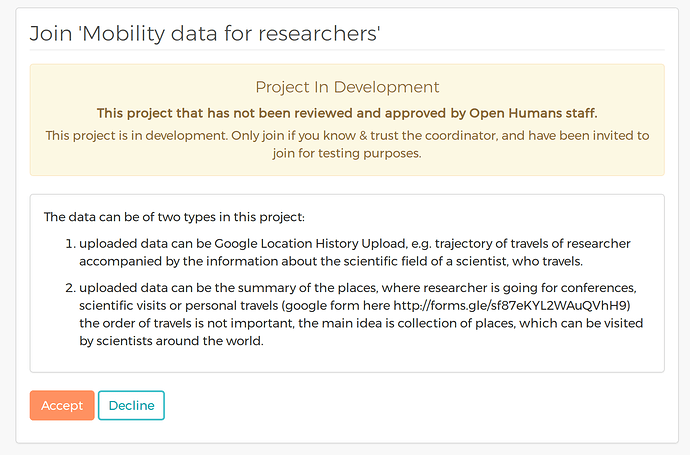Hi,
thanks for reviewing and suggestions, @wolfgang8741, I made various changes and I tried to answer to you and explain more in details something. Let me know if something is still needed to be clarified.
In general, one of the biggest interest for collecting and studying this data is that we can not just study the data about the mobility of mass of people (as it has been done in the past by big telecom.companies etc.), but look at patterns of particular mobility, e.g. how researchers or educators are traveling around the world.
Why these categories? First, because in general, people of these professions are responsible for knowledge transfer (conferences participation, workshop for doctors etc.) and it would be very important to learn how they are traveling and what could we do together to use this knowledge, which belongs to society.
The added possible benefit of preprocessing of timelines would be offering turnkey data for an analysis at new resolutions. Also offering limits to the needs of projects, ie what timeframe is necessary for sharing (last week, last month, a user’s entire digital life?).
Indeed, I can clarify the the timeframe - usually it starts with one week of stay and is unlimited. But information about any stay in the place is relevant, in general.
Another important point is how to collect the information about places, where people stayed and had free time (which could be later used for social engagement or citizen science projects, which is essentially one of the goals of the project).
Since this project is only interested in scientists, what metadata would be necessary to determine the start date of an analysis for example even though the data doesn’t go far enough back for all, some are young enough scientist where the data may go back before they are a scientist. I don’t see in the survey or other collection how that may be determined in an analysis, but that is just something to think about:…
The problem here is that there is no real basis (except Easychair data which is not open, as far as I know, maybe @madprime @gedankenstuecke know some other databasis like this). Although indeed I could have suggests to submit Easychair data additionally, but this may be a bit difficult since not every conference is using Easychair.
How does one judge the “potential of the untapped” in this project?
There are many ways. For example, there is one project, which is mapping places around the world, where people try to identify places needed for volunteering e.g. https://www.hotosm.org/ and this may be useful for identifying untapped opportunities for visits by people.
@wolfgang8741 I also adjusted the question in the questionnaire:
“What are the countries are you working with? (but maybe have not visited yet)”
Where is the ORCID collected? (pardon if I missed this)
We collect Openhumans ID, and if the person participates in the questionnaire and leaves the information about his/her research institute, we deduce that a person is a scientist. This is good point, I also included ORCID.
I also changed the google form for questionnaires to make it more precise with countries (not continents you visited). Thank you!
analysis of our travels and meta-information of who is traveling can provide more information about how we can use it for social good
Yes, I am going indeed to change it, since this connotation has been miss-used recently and can be therefore understood in too many different ways. I changed it, thank you for the comment!!






